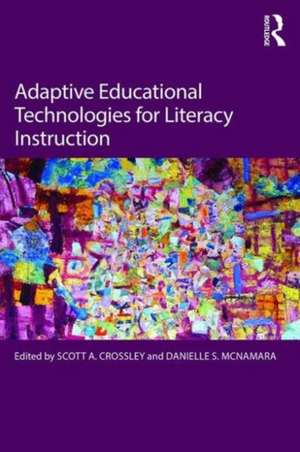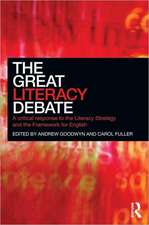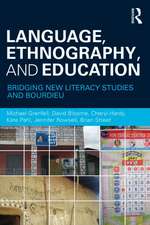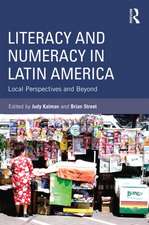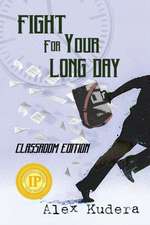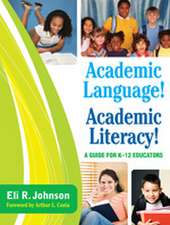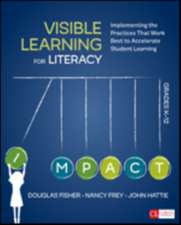Adaptive Educational Technologies for Literacy Instruction
Editat de Scott A. Crossley, Danielle S. McNamaraen Limba Engleză Paperback – 11 iul 2016
| Toate formatele și edițiile | Preț | Express |
|---|---|---|
| Paperback (1) | 483.16 lei 6-8 săpt. | |
| Taylor & Francis – 11 iul 2016 | 483.16 lei 6-8 săpt. | |
| Hardback (1) | 1005.01 lei 6-8 săpt. | |
| Taylor & Francis – 7 iul 2016 | 1005.01 lei 6-8 săpt. |
Preț: 483.16 lei
Nou
Puncte Express: 725
Preț estimativ în valută:
92.45€ • 96.79$ • 76.50£
92.45€ • 96.79$ • 76.50£
Carte tipărită la comandă
Livrare economică 05-19 aprilie
Preluare comenzi: 021 569.72.76
Specificații
ISBN-13: 9781138125445
ISBN-10: 113812544X
Pagini: 332
Ilustrații: 102
Dimensiuni: 152 x 229 x 26 mm
Greutate: 0.47 kg
Ediția:1
Editura: Taylor & Francis
Colecția Routledge
Locul publicării:Oxford, United Kingdom
ISBN-10: 113812544X
Pagini: 332
Ilustrații: 102
Dimensiuni: 152 x 229 x 26 mm
Greutate: 0.47 kg
Ediția:1
Editura: Taylor & Francis
Colecția Routledge
Locul publicării:Oxford, United Kingdom
Public țintă
PostgraduateCuprins
- Educational Technologies and Literacy Development by Scott A. Crossley and Danielle S. McNamara
- Challenges and Solutions when Using Technologies in the Classroom by Amy M. Johnson, Matthew E. Jacovina, Devin G. Russell, and Christian M. SotoSection I: Reading and Comprehension Technologies for the Classroom
- Assessment-to-Instruction (A2i)-An Online Platform for Supporting Individualized Early Literacy Instruction by Sarah W. Ingebrand and Carol McDonald Connor
- Common Core TERA: Text Ease and Readability Assessor by G. Tanner Jackson, Laura K. Allen, and Danielle S. McNamara
- Dynamic Support of Contextual Vocabulary Acquisition for Reading (DSCoVAR): An Intelligent Tutor for Contextual Word Learning by Gwen A. Frishkoff, Kevyn Collins-Thompson, SungJin Nam, Leslie Hodges, and Scott A. Crossley
- Intelligent Tutoring of the Structure Strategy: A Reading Strategy Tutor by Bonnie J. F. Meyer and Kausalai K. Wijekumar
- iSTART-2: A Reading Comprehension and Strategy Instruction Tutor by Erica L. Snow, Matthew E. Jacovina, G. Tanner Jackson, and Danielle S. McNamara
- TuinLEC: An Intelligent Tutoring System to Teach Task-Oriented Reading Skills to Young Adolescents by Eduardo Vidal-Abarca, Maria-Ángeles Serrano, Luis Ramos, Laura Gil, and Antonio FerrerSection II: Writing Technologies for the Classroom
- Commercialized Writing Systems by Laura K. Allen and Cecile A. Perret
- The Criterion® Online Writing Evaluation Service by Chaitanya Ramineni and Paul Deane
- We-Write: A Web-Based Intelligent Tutor for Supporting Elementary Classroom Teachers in Persuasive Writing Instruction by Kausalai K. Wijekumar, Karen R. Harris, Steve Graham, and Bonnie J. F. Meyer
- The Writing Pal: A Writing Strategy Tutor by Scott A. Crossley, Laura K. Allen, and Danielle S. McNamara
- Computer-Assisted Research Writing in the Disciplines by Elena Cotos
- Writing to Learn and Learning to Write through SWoRD by Christian SchunnSection III: Future Technologies for the Classroom
- Project LISTEN’s Reading Tutor by Jack Mostow
- EMBRACEing Dual Language Learners by Arthur M. Glenberg, Erin A. Walker, and M. Adelaida Restrepo
- The Language Muse Activity Palette: Technology for Promoting Improved Content Comprehension for English Language Learners by Jill Burstein and John Sabatini
- The Reading Strategy Assessment Tool: A Computer-Based Approach for Evaluation Comprehension Processes during Reading by Joseph P. Magliano, Melissa Ray, and Keith K. Millis
- Reading Comprehension Lessons in AutoTutor for the Center for the Study of Adult Literacy by Arthur C. Graesser, Zhiqiang Cai, Whitney O. Baer, Andrew M. Olney, Xiangen Hu, Megan Reed, and Daphne Greenberg
- Udio: Rich and Authentic Literacy Experiences for Struggling Middle School Readers by Alyssa R. Boucher, Miriam Evans, and Steve Graham
About the Authors
Index
Notă biografică
Scott A. Crossley is Associate Professor of Applied Linguistics at Georgia State University, USA.
Danielle S. McNamara is Professor in Cognitive and Learning Sciences and ISTL Senior Investigator at Arizona State University, USA.
Danielle S. McNamara is Professor in Cognitive and Learning Sciences and ISTL Senior Investigator at Arizona State University, USA.
Recenzii
"This book unquestionably achieves Crossley and McNamara’s goal of providing an invaluable resource for all those invested in improving the literacy skills of K-12 students and adults with reading and writing needs. The contributors—a virtual who’s-who in literacy and technology research—demonstrate not only the feasibility and utility of their tested technological systems, but also the many benefits accrued from their implementation. In light of the ever-expanding diversity in classrooms, the increasing assessment pressures on educators, and the growing demand for specialized technology knowledge, the information captured in this book is unparalleled. Every school administrator, every educational technologist, and every literacy researcher should learn from the critical information it conveys."
--Patricia A. Alexander, Jean Mullan Professor of Literacy and Director of the Disciplined Reading and Learning Research Laboratory, University of Maryland, USA
"Adaptive Educational Technologies for Literacy Instruction is an exciting resource for anyone wishing to make informed decisions about technology supports for reading and writing. The book identifies deliberate practice, individualized feedback, and strategy training as key components of literacy instruction. By describing the most promising current and emerging technologies this book will help teachers, decision makers, and researchers take advantage of technology for literacy instruction."
--Marcia C. Linn, Professor of Development and Cognition in the Graduate School of Education, University of California, Berkeley, USA
--Patricia A. Alexander, Jean Mullan Professor of Literacy and Director of the Disciplined Reading and Learning Research Laboratory, University of Maryland, USA
"Adaptive Educational Technologies for Literacy Instruction is an exciting resource for anyone wishing to make informed decisions about technology supports for reading and writing. The book identifies deliberate practice, individualized feedback, and strategy training as key components of literacy instruction. By describing the most promising current and emerging technologies this book will help teachers, decision makers, and researchers take advantage of technology for literacy instruction."
--Marcia C. Linn, Professor of Development and Cognition in the Graduate School of Education, University of California, Berkeley, USA
Descriere
Adaptive Educational Technologies for Literacy Instruction presents actionable information to educators, administrators, and researchers about available educational technologies that provide adaptive, personalized literacy instruction to students of all ages.
